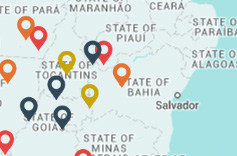Popular World Cup and Olympics Committee of Rio de Janeiro
The "Olympic Project" and human rights violations: Popular mobilization and the struggle for the right to the city
Rio de Janeiro
Objectives and target population:
The project aims to further publicize human rights violations in Rio de Janeiro due to the 2014 World Cup and 2016 Olympic Games. With this initiative, the committee will extend the mobilization of the population to defend the right to the city as well, specifically the right of citizens to participate in discussions about decisions related to the city in which they live.
The proposal is to call the attention of affected communities, Brazilian society and human rights defense organizations in Brazil and worldwide to the real legacy of the sporting mega-events: a more unequal city, with the exclusion of thousands of families; the destruction of entire communities; and the appropriation of the greatest part of the benefits by a few social and economic agents.
With the project, the group will bring information to nearly 30,000 people who suffer or will suffer from evictions, so that they are capable of resisting the advances made by government, in accordance with private actors; and for society in general.
Main activities:
– Community meetings with the objective of fomenting the creation of centers for reflection and action on the impacts of the big sporting events;
– Two large debates, for up to 500 people, in the mold of those already held by the Committee in 2011 and 2012, to reach a public that hasn’t been involved in discussions about preparations for the mega-events;
– Production and distribution of materials on the impacts of sporting mega-events;
– Reprinting of the Rio de Janeiro dossier with detailed information on the human rights violations going on in the city;
– Three public protests to give visibility to the communities’ struggle. The protests will be integrated with communications campaigns, with the press and through social networks, to extend the reach of their message.
Context:
Rio de Janeiro is the stage for several projects and activities to prepare the city for the 2014 World Cup and the 2016 Olympic Games. This process has been accompanied by disrespect for human rights and the collective right to the city, involving the right to housing, to mobility, to the environment, to work, to participation, among others.
Around 30,000 people are being removed or are threatened with eviction in violent processes without any guarantee of resettlement in an adequate location or just reparations. The expansion of the urban perimeter is being done without a proportional investment in infrastructure, especially in sanitation.
The transportation projects underway don’t indicate any improvement for city workers and instead look to benefit areas of interest to real estate speculation. Furthermore, they violate workers’ rights and don’t guarantee adequate safety to workers.
There is no transparency in the use of public resources and decisions on investments are being made without the population’s participation.
About the organization:
The mission of the Popular World Cup and Olympics Committee of Rio de Janeiro is to mobilize a large network of social organizations, popular movements, trade unions, human rights defenders, public budget oversight organizations, universities to empower communities directly and indirectly affected, monitor public and private interventions and articulate integrated actions against the adverse impacts of holding the mega-events in the city.
The committee has been active since 2010 and meets weekly. The group has already held two large public debates with the presence of Ermínia Maricato, Juca Kfouri, Raquel Rolnik, Altair Guimarães (from Vila Autódromo), among others.
The group produced the Dossier of Mega-events and Human Rights Violations in Rio de Janeiro (available to download in Portuguese at http://bit.ly/DossieRio2012), which has already been downloaded five thousand times, aside from the 500 physical copies distributed at its launch in April, 2012; and participated in the production of the national dossier (available in Portuguese at http://bit.ly/Mq3SQ9).
Partnerships:
The Popular World Cup and Olympics Committee of Rio de Janeiro makes up part of Ancop – the National Network of Popular World Cup Committees.
Funding Line
Urban Development (2012)
Year
-
Total Granted
-
Duration
-
Main Themes
The right to just and sustainable cities






